International courts and the performance of international agreements : a general theory with evidence from the European Union / Clifford J. Carrubba, Matthew J. Gabel.
Material type: TextSeries: Publication details: New York, NY : Cambridge University Press, c2015.Description: viii, 243 p. : ill. ; 23 cmISBN:
TextSeries: Publication details: New York, NY : Cambridge University Press, c2015.Description: viii, 243 p. : ill. ; 23 cmISBN: - 9781107677265
- 23 341.55 C237i
| Item type | Current library | Collection | Call number | Copy number | Status | Barcode | |
|---|---|---|---|---|---|---|---|
 Books
Books
|
JSW Law Library WR General Stacks | Non-fiction | 341.55 C237i (Browse shelf(Opens below)) | 1 | Available | A01398 |
Browsing JSW Law Library WR shelves,Shelving location: General Stacks,Collection: Non-fiction Close shelf browser (Hides shelf browser)
Includes bibliographical references and index (p 220-243)
Nations often turn to international courts to help with overcoming collective-action problems associated with international relations. However, these courts generally cannot enforce their rulings, which begs the question: how effective are international courts? This book proposes a general theory of international courts that assumes a court has no direct power over national governments. Member states are free to ignore both the international agreement and the rulings by the court created to enforce that agreement. The theory demonstrates that such a court can, in fact, facilitate cooperation with international law, but only within important political constraints. The authors examine the theoretical argument in the context of the European Union. Using an original data set of rulings by the European Court of Justice, they find that the disposition of court rulings and government compliance with those rulings comport with the theory's predictions-- Source other than Library of Congress.







